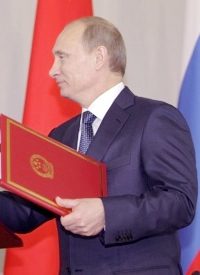
The long-awaited international renunciation of the dollar has begun.
China and Russia, who have been agitating internationally for several years now for alternatives to the U.S. dollar as the world’s reserve currency, have announced that they will no longer rely on the dollar in bilateral trade. Instead, the two Asian giants, whose respective economies have boomed in recent years and whose cross-border trade has swelled proportionately, will now use each another’s currencies for cross-border commerce.
On November 23 in St. Petersburg, visiting Chinese premier Wen Jiabao and Russian Prime Minister Vladimir Putin announced the new measure. Prior to the global financial crisis, the Russians and the Chinese used dollars and sometimes other “hard” currencies to trade with each another, but with the looming global currency crisis — precipitated in no small measure by the inflationary policies of the Federal Reserve — the Chinese and Russians have decided to put their money where their mouth is. Rubles have begun trading against the yuan in Chinese money markets, and the Chinese currency is poised to do the same in Moscow.
Nor is the change in exchange currencies the only sign of the growing Sino-Russian friendship. The St. Petersburg summit produced 12 different agreements ranging from intellectual property protection to energy production. China has agreed to purchase two advanced nuclear reactors from Russia, while Russia is working to negotiate a price for sale of more natural gas to the Chinese. Wen expressed satisfaction with the outcome of the latest summit, which followed a September visit by Russian President Dmitri Medvedev to China. At the press conference, Wen praised the “unprecedented level” of Sino-Russian cooperation and promised that the two countries will “never become each other’s enemy.” He also stated that “China will firmly follow the path of peaceful development and support the renaissance of Russia as a great power. The modernization of China will not affect other countries’ interests, while a solid and strong Sino-Russian relationship is in line with the fundamental interests of both countries.”
While no one should begrudge the Chinese and Russians their mutual admiration society, the unspoken subtext of such announcements is the determination to diminish the influence of the United States in global affairs. For the nonce, China and Russia are content with newly-allied currencies. In the longer run, however, stronger military ties are a likelihood, given the military rivalry between both countries and the American superpower: Russia, over NATO’s eastward expansion, and China, over Taiwan, the Korean peninsula, and naval dominance in the Pacific region in general.
For now, it is enough that the U.S. dollar is losing ground across the world, and that China and Russia in concert are the first major powers to openly repudiate it.
Rotator photo: Russian Prime Minister Vladimir Putin, right, and his Chinese counterpart Wen Jiabao shake hands during a document signing ceremony at the Konstantin Palace outside St. Petersburg, Russia, Nov. 23, 2010. (Wen is out of above picture.) AP Images



